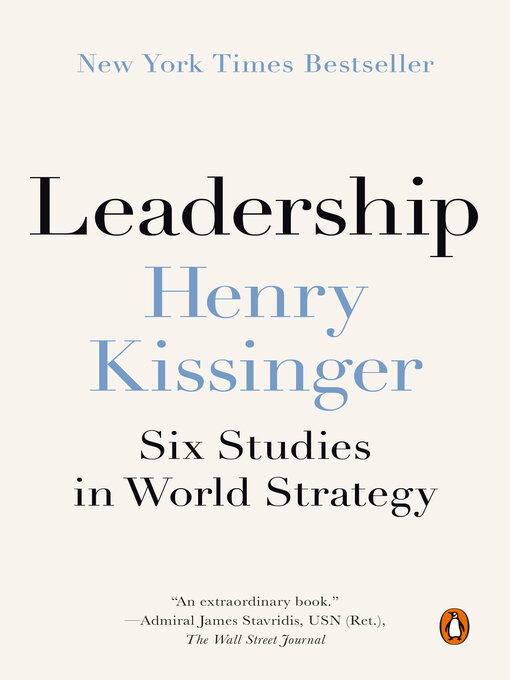- No wait, no problems
- What's new?
- Popular titles
- Check these out!
- Great Audiobooks for a Family Road Trip
- Audiobooks for the Whole Family
- See all audiobooks collections

“An extraordinary book.” —The Wall Street Journal
“Kissinger is the genuine article, and worth listening to.” —Financial Times
“A must read. . . . His books—including this one—will hopefully be read well into the future.” —New York Journal of Books
Henry Kissinger, consummate diplomat and statesman, examines the strategies of six great twentieth-century figures and brings to life a unifying theory of leadership and diplomacy
“Leaders,” writes Henry Kissinger in this compelling book, “think and act at the intersection of two axes: the first, between the past and the future; the second, between the abiding values and aspirations of those they lead. They must balance what they know, which is necessarily drawn from the past, with what they intuit about the future, which is inherently conjectural and uncertain. It is this intuitive grasp of direction that enables leaders to set objectives and lay down a strategy.”
In Leadership, Kissinger analyses the lives of six extraordinary leaders - Konrad Adenauer, Charles de Gaulle, Richard Nixon, Anwar Sadat, Lee Kuan Yew, and Margaret Thatcher - through the distinctive strategies of statecraft that he believes they embodied. To each of these studies, Kissinger brings historical perception, public experience and, because he knew each of the subjects and participated in many of the events he describes, personal knowledge. Leadership is enriched by insights and judgements that only Kissinger could make and concludes with his reflections on world order and the indispensability of leadership today.
-
Creators
-
Publisher
-
Release date
July 5, 2022 -
Formats
-
Kindle Book
-
OverDrive Read
- ISBN: 9780593489451
-
EPUB ebook
- ISBN: 9780593489451
- File size: 5887 KB
-
-
Accessibility
-
Languages
- English
-
Reviews

Loading
Formats
- Kindle Book
- OverDrive Read
- EPUB ebook
Languages
- English
Why is availability limited?
×Availability can change throughout the month based on the library's budget. You can still place a hold on the title, and your hold will be automatically filled as soon as the title is available again.
The Kindle Book format for this title is not supported on:
×Read-along ebook
×The OverDrive Read format of this ebook has professional narration that plays while you read in your browser. Learn more here.